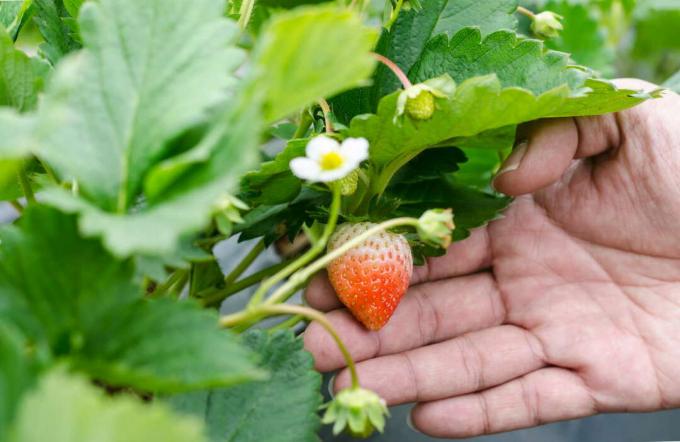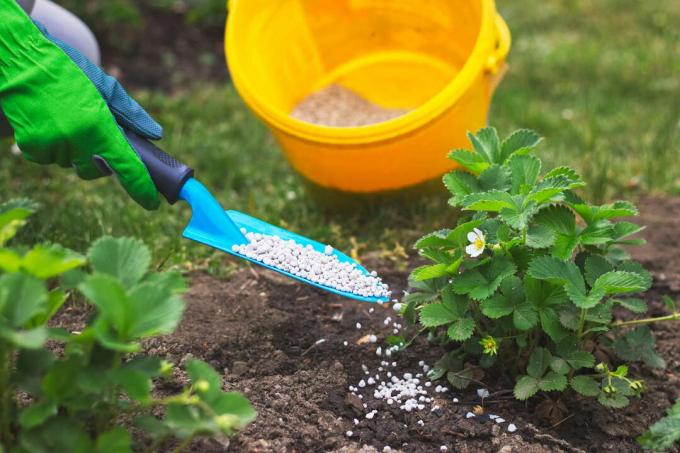In order for strawberries to thrive as productively as possible, they need nutrients. We show which fertilizers are suitable and when fertilizer should be used at all.

The nutritional needs of strawberries (Fragaria) is not very high and many garden soils are supplied with sufficient and balanced nutrients anyway. In order to maintain the health of the plants, it is nevertheless advisable to support the strawberries in their development with needs-based fertilization. Then nothing stands in the way of a rich harvest of sweet, red fruits.
The correct fertilization of strawberries needs to be learned, after all, neither a deficiency nor an excess of nutrients is optimal. In this article, we will explain when, how and with what the best way to fertilize your strawberries.
contents
- Strawberries: when to fertilize?
- Fertilize strawberries with what and how much?
-
Fertilize strawberries organically
- Fertilize strawberries with horn shavings
- Fertilize strawberries with coffee grounds
- Fertilize strawberries minerally with blue grain and Co
Strawberries: when to fertilize?
Strawberries are best fertilized when they are planted and then every year in autumn and spring. You can continue like this for about two to three years. After that, the stock should be rejuvenated, as the plants become less productive with increasing age. Plant the existing strawberry bed with other cultures for a few years. In the case of the rose family (Rosaceae), which also includes the strawberry, so-called soil fatigue can occur over time.
Shortly before or during planting, adding compost helps the plantlets to grow successfully. If you do not have your own compost heap in the garden, it is best to use organic long-term fertilizers such as ours Plantura organic tomato fertilizer. This is particularly gentle on your strawberries, the soil and the animals in the garden.

After harvesting in autumn (September), when the strawberry plants form the flowers for the next year, you should provide them with a sufficient amount of nutrients again. A small dose of fertilizer and the additional watering with diluted nettle manure promote the development of the plant. Another application of fertilizer in spring (April) supports the strawberry plant in successful fruit formation. In addition, the plant, which originally lives in the forest, loves slightly acidic soil, which is why it is happy about a mulch layer made of grass clippings, straw or pine needles. You should replace these from time to time due to the slow decomposition.
Summary: when to fertilize strawberries?
- When planting: incorporate compost or organic long-term fertilizer
- Smaller doses of fertilizer for flowering in autumn (September)
- Fertilization to support fruit formation in spring (April)
- Mulch layer of grass clippings, straw or pine needles

Fertilize strawberries with what and how much?
Strawberries do not have high nutritional requirements. Classic organic fertilizers such as compost, composted manure or organic commercial fertilizer are therefore perfectly sufficient for plentiful flowering and fruiting. We will explain how best to proceed and what other options are available to you for fertilizing your strawberries.
Fertilize strawberries organically
Organic Fertilizers such as manure or compost, promote soil life and improve the soil structure in the long term. They have proven particularly useful for autumn fertilization of strawberries. They are already partially decomposed over the winter and thus offer the plants good starting conditions in spring. If you don't have your own compost pile, you can go organic long-term fertilizer withdraw from the trade. These have many advantages when fertilizing strawberries, such as:
- Long-term supply of nutrients to the strawberry plants through slow decomposition with the help of microorganisms from the soil
- Promotion of active soil life and long-term improvement of soil structure
- Gentle on the plants, the soil and the environment by not using chemicals
Our Plantura Organic Tomato Fertilizer, who also tomatoes and potatoes optimally supplied, is ideal for fertilizing your strawberries. It consists mainly of organic, plant-based raw materials that are slowly decomposed by the microorganisms in the soil. The high proportion of potassium and phosphorus supports your plant in flowering and fruiting. The nitrogen it contains also promotes plant growth and leaf formation.

To ensure that you provide your strawberries with the optimal amount of nutrients, we have prepared precise fertilization instructions for you below:
Primarily organic long-term fertilization: instructions and dosages for strawberries
- Before planting: 60-110 g/m² (5-9 tablespoons) of ours Plantura organic tomato fertilizer Work into the top layers of soil
- Water the soil and the freshly planted plants well so that the granules can dissolve
- Fertilize 40 - 70 g per plant (3 to 5 heaped tablespoons) in autumn after harvest and in spring
tip: Do you already have ours Plantura organic universal fertilizer at home, you can also use it wonderfully for fertilizing strawberries.
Fertilize strawberries with horn shavings
horn shavings are among the organic fertilizers and are often used in organic farming. They are made from the horns and hooves of cattle and are very nitrogenous. However, since strawberries need a lot of potassium above all, horn shavings or horn meal are only partially suitable for their nutrient supply. Therefore, they should only be used - if at all - for spring fertilization and in combination with other organic fertilizers.
Fertilize strawberries with coffee grounds
The usage of Coffee grounds as fertilizer is becoming more popular. No wonder, after all, almost all of us already have one at home. Coffee grounds are slightly acidic, which makes them ideal for strawberries and other berries, all of which prefer slightly acidic soil (pH 6). However, the content of nutrients in coffee grounds is not very high, and it is also very nitrogenous. Therefore, it is not suitable as the sole fertilizer for strawberries.
We therefore recommend anyone who has one compost has to put only small amounts of coffee grounds directly on the strawberries. You can then enrich your compost with the remaining coffee grounds. Finally, the composted coffee grounds with the compost then benefit the strawberries again. If you don't have compost, you can work larger amounts of coffee grounds directly into the soil of the strawberries. In addition, you should treat the plants with an organic commercial fertilizer - such as our Plantura Organic Tomato Fertilizer - supply. Of course, you then apply a slightly lower amount than recommended on the package.

Fertilize strawberries minerally with blue grain and Co
blue grain, liquid fertilizer and Co. are among the mineral compound fertilizers. These contain very high concentrations of nutrient salts, which the plants can absorb directly from the soil solution. However, strawberries do not have very high nutritional requirements. This is why they tend to react to excessive fertilization with an undesirably strong formation of leaves rather than with more fruit. In addition, over-fertilization can lead to the leaching of nutrients into deeper soil layers and to contamination of the groundwater. For this reason, organic fertilizers, with their slow release of nutrients, are much more suitable for strawberries than mineral fertilizers.

Summary: What to fertilize strawberries with?
- Compost or manure are suitable for autumn fertilization
- Organic long-term fertilizers ensure a long-term supply of nutrients in spring
- Horn shavings and mineral fertilizers are only suitable to a limited extent
- Coffee grounds are best with compost or organic long-term fertilizer mix up
Tip from the pro: Strawberries that are under drought stress cannot absorb any nutrients, as these are no longer accessible to the roots or only to a limited extent. You should therefore ensure that there is an adequate water supply during and after fertilization.
Proper fertilization is an essential part of strawberry care, but it is not the only thing to consider when growing strawberries. Therefore, we have additional tips for you here planting strawberries compiled.



